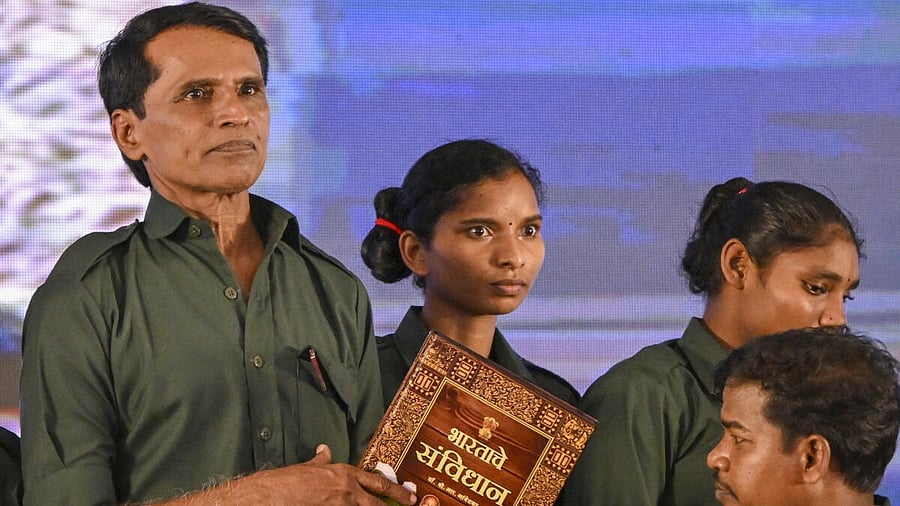
Naxal leader Mallojula Venugopal Rao alias Bhupathi surrendered before Maharashtra Chief Minister Devendra Fadnavis in Gadchiroli, Maharashtra, on Wednesday.
Credit: PTI Photo
Hyderabad: A prominent figure in the Maoist movement, Mallojula Venugopal Rao, known by his aliases Sonu, Bhupathi, and Master, who surrendered on Wednesday, played a defining role in shaping the trajectory of the CPI (Maoist) through his work as a strategist, organiser, senior commander, and principal spokesperson. His imprint on both the ideological and operational dimensions of the movement remains indelible.
Born on May 10, 1956, at Peddapalli in Karimnagar district of present-day Telangana, Venugopal hailed from a family rooted in priesthood and freedom fighting. He was the youngest of three sons. His elder brother, Mallojula Koteshwar Rao, better known as Kishenji, was also a top Maoist leader who was killed in a police encounter in West Bengal in 2011. Venugopal completed his commerce degree from Peddapalli.
According to intelligence sources, Venugopal was central to planning several large-scale attacks against security forces, including high-profile operations such as the Dantewada massacre, an incident that demonstrated his tactical acumen in guerrilla warfare and ambush execution.
He led the Dandakaranya Special Zonal Committee, overseeing logistics, recruitment, training, and coordination of armed activities across Chhattisgarh, Maharashtra, and adjoining States. As head of the Central Military Commission, he strengthened the Maoists’ offensive capabilities by advising regional commanders and enforcing strict operational secrecy.
Venugopal also played a pivotal role in shaping Maoist ideology and propaganda after 2010, serving as the party’s chief spokesperson. He produced policy statements, pamphlets, and manifestos that refined the party’s outreach and messaging. Under his direction, Maoists expanded their influence through local governance initiatives known as janatana sarkar (people’s government), which consolidated their authority across remote tribal belts of the 'Red Corridor'. His strategic efforts helped broaden the movement’s base into newer areas such as southern Maharashtra, Telangana, and the Western Ghats.
“Venugopal mentored new cadres and emerging leaders, ensuring the organisation’s continuity and ideological consistency despite internal rifts and growing security pressure,” said an intelligence officer familiar with Maoist operations. “He promoted political education among cadres and sought to recalibrate armed struggle with political engagement, occasionally advocating short pauses in violence to reassess strategies,” the officer added.
As spokesperson, Venugopal handled press statements, negotiations during hostage crises, and the articulation of Maoist positions to the media and public, a role that shaped both the group’s morale and its perception among sympathisers. He also led ideological campaigns aimed at balancing militancy with outreach to sections of the intelligentsia and civil society.
Venugopal’s ability to merge strategic violence with deep organisational discipline and ideological conviction made him one of the most influential leaders in the history of India’s Maoist movement.